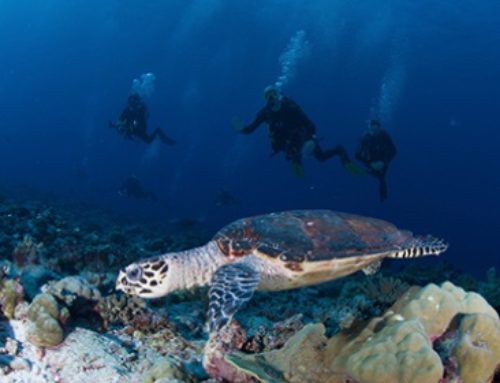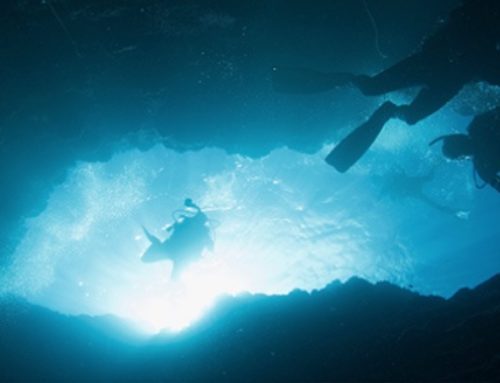Substance turned 15 this year. Over the course of these years I’ve learned a great deal about creativity, clients, and the nature of collaboration.
As a certified rescue SCUBA diver, I’ve learned lessons that are applicable to running a branding firm. It seemed only natural to weave these together.
Here’s are 15 business lessons as seen through the lens of diving.
11. Step out of your comfort zone.
It’s easy to step and repeat the same solution. Hey, it’s proven, it’s worked before, why not do it again?
Because it’s boring. And it’s not going to facilitate growth or creativity.
It’s easy to get caught up in the momentum of your routine and focus simply on getting things done.
What about experimenting and trying something new?
Just as I wouldn’t want to dive the same site over and over, there’s little to be gained by repeating yourself in your work. Try a new approach. Don’t be afraid to fail. If you do, chances are you will learn something that will be more worthwhile than using a tried and true solution that you know will work.
12. Communicate with your team.
The inability to speak underwater is one of my favorite aspects of diving. There’s a beauty in the quiet, a shared solitude in hearing only the sound of your own breathing.
That doesn’t mean you don’t communicate. We all learn the universal hand signals.
Thumbs up means “I want to go up.”.
Thumbs down means “Lets dive deeper.”
Two fingers to the other hand’s palm is asking “How much air do you have?”
The thumb and index finger making an O with the other three fingers released is a question and an answer: “Are you okay?” and “Yes, I’m okay.”
This last one is most important. On a deep dive it’s good to check in and give the okay signal to your buddy even if nothing is wrong. It’s a reassurance, a signal that you are paying attention to his welfare, and he to yours.
Always maintain a bias toward communication.
How many of us have sent an email requesting a status update and not heard anything back? It can be frustrating. For many people, not knowing the situation is worse than hearing bad news.
And if a vendor has given you an estimate for a project and it didn’t come through for them, give them the courtesy of a response. The same applies for job applicants. If they took the time to interview or submit an application, they deserve to hear from you.
Even if that response is “still waiting”.
13. The more you dive, the less weight you need to carry.
One of the first challenges in learning to dive is getting beneath the surface. Not metaphorically, I mean literally allowing yourself to sink.
We wear weights that help us drop below the waves. The amount is adjusted and fine tuned over time, depending upon the amount of gear, thickness of the wetsuit, and the experience of the diver.
In our initial dives, there’s so much to take in that we often forget to exhale fully, filling our lungs, bringing stubborn buoyancy to our bodies that can only begin to be counteracted by adding a few extra pounds to your weight belt. But then we adjust, we learn to become more comfortable with our breath and our presence underwater; then we start to put techniques into practice, controlling our breathing, remembering to exhale when we feel ourselves floating up.
The longer I’ve been diving the more weight around my weight belt I’ve shed. Maybe it’s my body becoming accustomed to being underwater, or perhaps it’s me having learned to control my breathing.
The more I’ve moved through life, the more I’ve lived, the more baggage I’ve learned to shed. Not the physical weight we put on, but the weight we always seem to carry with us; the heaviness that falls on our chest and shoulders and seems to drag us down.
Sometimes this weight comes from ourselves. Sometimes we inadvertently let others impose their weight and baggage upon us. If you’re not careful it can ultimately sink you and drain your efforts and energy.
That’s when we need to exhale and let go. Let go of toxic people or anything that does not energize and elevate us. It’s amazing how much unnecessary weight we cling to that we don’t need.
If it’s not lifting you up, it’s probably bringing you down.
14. Allow yourself be overwhelmed.
Some divers act like they’ve seen it all and done it all.
Tell them about the reef shark you saw, and they’ll show you a picture of a school of hammerhead. Get excited about a dive in the Keys and they’ll tell you it’s nothing compared to Indonesia.
It’s almost as if they intentionally don’t want to be excited.
It’s easy to lapse into that blasé attitude in your career. After enough projects and clients, it can be a challenge to maintain the excitement and passion for the work.
On a dive in Socorro, I got up close and personal with an oceanic manta ray. Mantas are immense and can reach wingspans of up to 20 feet. They are also highly intelligent, with the largest brain relative to their body ratio of any fish in the ocean.
This manta caught my eye (actually I caught his) and he proceeded to swim up close to me within a few feet. Looking into his eyes it was obvious the lights were on inside. They radiated intelligence and curiosity.
We engaged in a little underwater dance for a few minutes until he lost interest and swam away.
After we surfaced and returned to the boat, I was casually washing my gear and cleaning off my mask. Then a wave of emotion hit me from nowhere and I started bawling, I was so overwhelmed with what I had just experienced.
My dive buddy asked me if I was okay and the only words I could muster were “It’s so beautiful.”
I was finally able to collect myself and finished the gear washing.
At first I felt silly.
I’m by no means immune to tears but I’m not a particularly emotional person. But I felt an immense sense of gratitude and relief for allowing myself to be overwhelmed by the experience.
Some people take pride in not letting themselves be too impressed. That seems a terrible way to go through life.
Take it all in and occasionally let yourself surrender to the experience. That’s how I want to feel when I see brilliant creative work.
I don’t want to feel jaded. I want to be awed.





